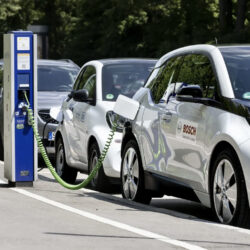Stefan Hartung, Bosch: ‘‘Shortage of computer chips is structural’’

German car makers have been forced to halt production due to a shortage of computer chips on more than one occasion recently. This is now having a knock-on effect on suppliers, as Stefan Hartung from Bosch knows all too well. Hartung expects that the shortage will continue for some time and calls it a “structural problem”.
The German manufacturing industry’s need for high-quality microelectronics is greater than ever. In a recent interview with Dutch financial newspaper FD, Hartung – who is responsible for mobility at global electronics and mechatronics leader Bosch – refers to it as a chain reaction. The operational disruption at German car factories mean that vehicles are not being finished, which is subsequently causing problems for suppliers like Bosch too.
Double whammy for Bosch
The computer chip crisis has been a double whammy for the Bosch group, which not only makes components for the automotive industry, but also manufactures numerous household appliances which likewise require chips. Hartung describes the economic effects of the pandemic and the chip shortages as “far-reaching” and predicts that they will continue to be felt for a long time. “I hope to see a little light at the end of the tunnel in the fourth quarter,” says Hartung in FD.
Moreover, the chip shortage has come at an extremely unfortunate time – just when BMW, Daimler, Volkswagen and industry suppliers Bosch and Continental are building ever-more electric cars which require lots of semiconductor technology for their control systems. Hartung therefore concludes that there is no longer just a scarcity of computer chips, but rather a structural shortage: “There will continue to be a structurally higher demand.” The only solution, he says, is to build lots more chip factories. “But they can’t be built overnight.”
Cancelled orders
The chip shortages in the automotive industry first arose last summer. At the start of the pandemic, factories temporarily shut down and cancelled their outstanding orders for microprocessors. When demand for cars picked up again faster than expected, the manufacturers’ orders had to join the back of the queue at their suppliers. However, that is not the only reason for the shortage according to Hartung: “Look at how many units were produced in the automotive industry in the first quarter. The volumes are not small. Suppliers such as Taiwan’s TSMC say that the situation will remain critical for some time. There’s a reason for that: they have no more room to manoeuvre due to the booming demand – and much of that demand is coming from the automotive industry. Everyone wants to build more vehicles, because the demand is there from buyers.”
Squeeze on several fronts
He believes that the squeeze is not limited to the computer chip industry, but is also occurring in the production of things like battery cells and other essential products for the automotive industry – and that is risky: “You always have to look at individual materials and individual supply chains, of course, but there are bottlenecks in the production of steel, plastics and electronics across the board. It hasn’t got so critical as with semiconductors yet, but we’re keeping a close eye on things. The worst thing that can happen for an industry like this is a steel crisis. If car manufacturers can’t get enough steel, we know the problems are going to be very big,” Hartung told FD.










